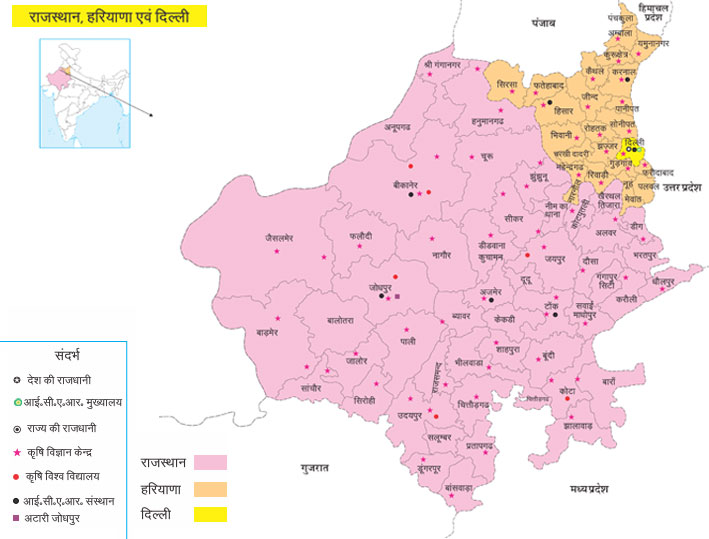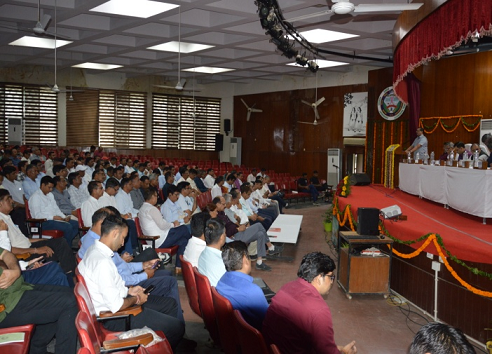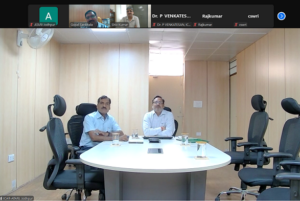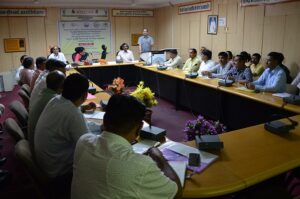Welcome to

Recent News
Notice | Tender | Recruitment
Zonal Review Workshop
333 Zonal Review Workshop of KVKs under NICRA-TDC at ICAR-ATARI, Jodhpur 19-20 July 2024 30 Jan, 2019 - 09:00 pm
Zonal Review Workshop
333 Zonal Review Workshop of KVKs under NICRA-TDC at ICAR-ATARI, Jodhpur 19-20 July 2024 30 Jan, 2019 - 09:00 pm
Zonal Review Workshop
333 Zonal Review Workshop of KVKs under NICRA-TDC at ICAR-ATARI, Jodhpur 19-20 July 2024 30 Jan, 2019 - 09:00 pm
Zonal Review Workshop
333 Zonal Review Workshop of KVKs under NICRA-TDC at ICAR-ATARI, Jodhpur 19-20 July 2024 30 Jan, 2019 - 09:00 pm
Zonal Review Workshop
333 Zonal Review Workshop of KVKs under NICRA-TDC at ICAR-ATARI, Jodhpur 19-20 July 2024 30 Jan, 2019 - 09:00 pm
Lorem ipsum dolor sit amet, consectetur adipiscing elit. Morbi luctus sit amet sapien nec mollis.
Lorem ipsum dolor sit amet, consectetur adipiscing elit. Morbi luctus sit amet sapien nec mollis. Maecenas cursus velit sem, eu viverra ante ultricies quis. Sed volutpat, turpis vitae tincidunt condimentum, odio erat laoreet tortor,
Publications
Photo Gallery
ICAR - Agricultural Technology Application Research Institute, Jodhpur : An Overview
The Indian Council of Agricultural Research (ICAR) is an autonomous organisation under the Department of Agricultural Research & Education (DARE), Ministry of Agriculture and Farmers Welfare, Government of India. Agricultural Extension Division is one of the Subject Matter Divisions where the major activities are of Assessment and Demonstration of Technology/Products through a network of 690 Krishi Vigyan Kendras (KVKs). The Division of Agricultural Extension, ICAR, New Delhi is headed by Deputy Director General (Agricultural Extension) supported by 2 Assistant Director Generals. The thrust areas of Agricultural Extension Division are:
- Assessment and demonstration of technology/products.
- Training of practising farmers, farm women and vocational training for rural youth.
- Training of extension personnel.
- Single window delivery system for technology products, diagnostic services and information through, Agricultural Technology Information Centres (ATICs)
- Development of gender-specific technologies, and
- Creating awareness of improved agriculral technologies among the farmers.
- Technology Application, assembling and feedback
- Institution building and partnership
ICAR-Agricultural Technology Application Research Institute (ATARI), Jodhpur is one of the 11 ICAR-ATARIs formerly known as Zonal Project Directorates (ZPDs) functioning under Division of Agricultural Extension. ICAR has established a vast network of KVKs all over the country under the administrative control of various ICAR institutes, State Agricultural Universities (SAUs), State Department of Agriculture, Non-Governmental Organisations (NGOs) and other institutes for implementing the central governmental projects/schemes. In the Zone, 7 Agricultural Technology Information Centres (ATICs) are working for delivering the "Single Window" delivery system. Since, Zonal Project Directorate has been elevated as ICAR-Agricultural Technology Application Research Institute (ATARI), the mandates of ICAR-ATARI has also been changed where



 Total 137 participants took part in the workshop. They included CBG representatives, nodal officers and Sr. Scientists & Heads of 25 KVKs of Rajasthan and Haryana, researchers of RARI, Durgapura and farmers of various KVKs. Director, ICAR-ATARI, Jodhpur in his address detailed out the concept, design and implementation strategy of project, awareness and demonstration on FOM/LFOM through KVKs’ in which 25 KVKs of Rajasthan and Haryana are partners. Dr. H.N. Meena, Principal Scientist & Nodal Officer of the project gave a broader outline of the project. Several KVKs highlighted the presence of non-functional CBG units in the district and requested change of CBGs. The discussions highlighted the prospects of FOM/LFOM and potential in enhancing crop yields, challenges and implementation issues in the project. All the three major stakeholders-researchers, extension personnel and representatives of CBG plants highlighted their experiences, challenges and scope of FOM/LFOM in agriculture with a broader aim of sustainability and profitability to farmers. The local coordination for the workshop was done by Dr. D.S. Bhati, Head, KVK, Ajmer in coordination of Team RARI, Durgapura.
(Source: ICAR-Agricultural Technology Application Research Institute, Jodhpur, Rajasthan).
Total 137 participants took part in the workshop. They included CBG representatives, nodal officers and Sr. Scientists & Heads of 25 KVKs of Rajasthan and Haryana, researchers of RARI, Durgapura and farmers of various KVKs. Director, ICAR-ATARI, Jodhpur in his address detailed out the concept, design and implementation strategy of project, awareness and demonstration on FOM/LFOM through KVKs’ in which 25 KVKs of Rajasthan and Haryana are partners. Dr. H.N. Meena, Principal Scientist & Nodal Officer of the project gave a broader outline of the project. Several KVKs highlighted the presence of non-functional CBG units in the district and requested change of CBGs. The discussions highlighted the prospects of FOM/LFOM and potential in enhancing crop yields, challenges and implementation issues in the project. All the three major stakeholders-researchers, extension personnel and representatives of CBG plants highlighted their experiences, challenges and scope of FOM/LFOM in agriculture with a broader aim of sustainability and profitability to farmers. The local coordination for the workshop was done by Dr. D.S. Bhati, Head, KVK, Ajmer in coordination of Team RARI, Durgapura.
(Source: ICAR-Agricultural Technology Application Research Institute, Jodhpur, Rajasthan). Dr. S. K. Malhotra, VC, MHU, Karnal mentioned that KVKs should be treated a one stop solution of the district and KVKs should focus on knowledge depository, market/trade issues, high value crops/export potential crops, soil carbon improvement, etc. He also emphasized on validation of ITKs through KVKs.
Dr. R. K. Singh, ADG (AE), ICAR emphasized upon cluster FLDs with role of KVKs in augmentation of production, removal of constrains in implementation of ARYA project, FPOs, introduction of climate resilient varieties through NICRA TDC, seed chain management, CRM, etc..
Dr. Ram Chand, Former ADG (AE), ICAR mentioned his concerns on competency development of KVKs, knowledge enhancement of KVK personnel, database development, feedback analysis, etc.
Dr. J. P. Mishra, Director, ICAR-ATARI, Jodhpur welcomed the delegates and provided an overview. He highlighted his views on reducing chemical and carbon footprints, enhancing oilseeds and pulses production, identification of districts for implementation of PPV&FRA. He also mentioned that KVK system is the largest extension network in the country which is celebrating golden jubilee of its establishment of first KVK in the country. As most of the KVKs have completed their 40 years of establishment, there is a need for making analysis of KVK’s impact on growth of agriculture in the district and social benefits.
Dr. R. G. Agrarwal, Chairman, Dhanuka Agritech mentioned that the problems of small and marginal farmers are to be addressed on priority. To reduce the gap in implementation help of ICT is required. To this regard, Public-Private-Partnership can play a great role.
In the workshop a total of 23 publications of ATARI and KVKs were released.
In the 3 days Annual Zonal Workshop 66 KVKs of Rajasthan, Haryana and Delhi and 7 Directors of Extension of SAUs will present the progress made by them during 2023.
Dr. S. K. Malhotra, VC, MHU, Karnal mentioned that KVKs should be treated a one stop solution of the district and KVKs should focus on knowledge depository, market/trade issues, high value crops/export potential crops, soil carbon improvement, etc. He also emphasized on validation of ITKs through KVKs.
Dr. R. K. Singh, ADG (AE), ICAR emphasized upon cluster FLDs with role of KVKs in augmentation of production, removal of constrains in implementation of ARYA project, FPOs, introduction of climate resilient varieties through NICRA TDC, seed chain management, CRM, etc..
Dr. Ram Chand, Former ADG (AE), ICAR mentioned his concerns on competency development of KVKs, knowledge enhancement of KVK personnel, database development, feedback analysis, etc.
Dr. J. P. Mishra, Director, ICAR-ATARI, Jodhpur welcomed the delegates and provided an overview. He highlighted his views on reducing chemical and carbon footprints, enhancing oilseeds and pulses production, identification of districts for implementation of PPV&FRA. He also mentioned that KVK system is the largest extension network in the country which is celebrating golden jubilee of its establishment of first KVK in the country. As most of the KVKs have completed their 40 years of establishment, there is a need for making analysis of KVK’s impact on growth of agriculture in the district and social benefits.
Dr. R. G. Agrarwal, Chairman, Dhanuka Agritech mentioned that the problems of small and marginal farmers are to be addressed on priority. To reduce the gap in implementation help of ICT is required. To this regard, Public-Private-Partnership can play a great role.
In the workshop a total of 23 publications of ATARI and KVKs were released.
In the 3 days Annual Zonal Workshop 66 KVKs of Rajasthan, Haryana and Delhi and 7 Directors of Extension of SAUs will present the progress made by them during 2023.










